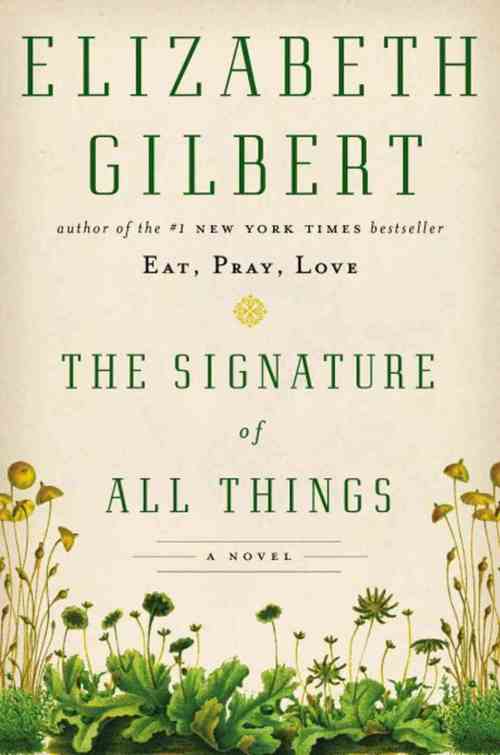Let’s get one thing straight here: this book is a dangerous thing to read in the wrong bar. I was hanging out on my lunch, enjoying The Signature of All Things, and not one but two women approached me to tell me that Eat, Pray, Love had helped them gather the strength to “follow their passions.” I’m here to tell you that this is a risk you ought to undertake, though I recommend you digest this volume in the privacy of your home. As I mentioned the other day, girlfriend wrote Coyote Ugly, and for the record, Eat, Pray, Love is whitegirlproblems but it is well-written, thoughtful whitegirlproblems.

The cover doesn’t show you this, but there are really pretty botanical illustrations inside! Isn’t this cover kinda boring? It is. It totally is.
The Signature of All Things is sprawling, but briefly, it’s an 80-year tour of the life and times of Alma Whittaker, a autodidact botanist from Philadelphia. Her father, Henry, is something of an American success story. A poor boy, he makes himself useful to Joseph Banks and James Cook, explores the globe, and makes a name for himself in the new world in the realm of medicinal plants and decorative flowers. I can’t even begin introduce everyone who wanders in and out, but that’s the basic premise.
Alma isn’t very pretty, nor is she very well-socialized. She isn’t close to her (very beautiful) adopted sister Prudence, nor does she have any other friends save a dotty neighbor girl named Retta who seems like a character from a fairy tale. Her mother is forbidding, her father is something of a loon, and men don’t take much notice of her unless it’s to talk about smart people stuff. Even though she’s rich and bright, Alma is really, really lonely. Time marches on, and her crushes go unrequited and the world moves on and Alma’s just out in her mansion, reading books in Greek by herself.
Enter a man named Ambrose Pike, a genius botanical illustrator. He’s almost like the answer to Alma’s prayers. He’s handsome and loves the natural world, like her, and he loves her. When he sort of asks her to marry him, she jumps at the chance. Things don’t really go according to plan on that front, and I don’t really feel like I’m giving anything away on that one. If you’re reading this book and thinking this wedding is a good idea, you and I have different ideas of how dating should work. She sends Ambrose away to Tahiti when things fall apart, and he dies there. Though she’s getting on in years by 1800s standards, she goes to the island and then on to the Netherlands to pick up the pieces of her life. I think this is an adequate summary of events.
The Signature of All Things is a work of fiction, but I kept forgetting that. Alma’s research, the world of her estate, her father’s discoveries- they all felt so real. There’s a staggering amount of research that undergirds every left turn, and I’m sure there’s much that’s invisible to me, the casual reader. I found myself googling “alma+whitaker” and “vandevender+botany+amsterdam” and “bryology” to attempt to ascertain where fact ended and invention began. I’m still not sure, so tight is the tiny, erudite world Gilbert has created. I was in awe for much of the 500 pages on account of the scope of knowledge contained within.
That said, The Signature of All Things is too long in some parts, and too short in others. I loved Gilbert’s storytelling and sprawling prose, but there were so many things going on at once that I kind of got twisted up sometimes. I was so immersed in my hope that Alma was finally going to lose her virginity that I almost missed the big plot point that is the uh….great discovery of her career (this is actually a pretty smart commentary about the status of women in the sciences at the time). I loved the exploration of female longing and sexuality, as well as the erotic lives of plants, but wanted more in the way of descriptions of Alma and her father’s actual work. I learned a lot of the purple novels of early America, but didn’t get any concrete details of Alma working, just that she did. Some of the characters of the early parts of The Signature of All Things are distracting, even though they’re fully realized and smartly detailed. I was so mired in the morass that was the Tahiti portion of the novel that I never worked out if her erstwhile husband was gay and deeply attracted to Asian men or a bizarre, possibly mentally ill mystic. The Amsterdam story line featured so many unexpected and maybe irrelevant characters that the end felt rushed and a little bit like a cop out. I never figured out why Alma’s sister didn’t develop a personality, or why her only friend got so crazy. I would have liked to have known that, or at least had some hints.
I’m glad I read The Signature of All Things, and that I gave Elizabeth Gilbert a chance. It was an easy, interesting read, and for all its frustrations, it has much to recommend it. I learned much about mosses, a few words of Dutch, and a couple things about Ben Franklin. My appreciation for botanical drawings is much greater than it was this time last week. I am now much more likely to defend liking the cheesecake at the Cheesecake Factory in fashionable circles. You can’t say that about most novels.
Have you read this or Pilgrims? I read that and really liked it. Thoughts?
Next week, I’m reading this. I’d love to talk with you about it!